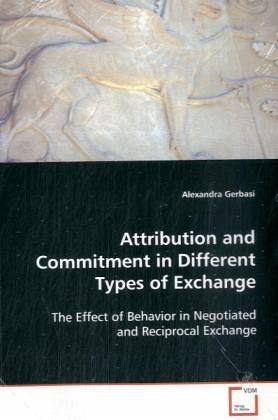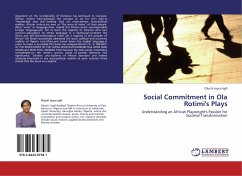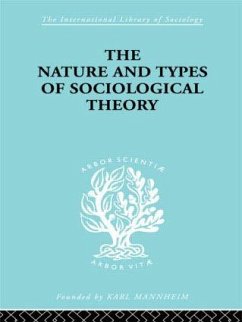
Attribution and Commitment in Different Types of Exchange
The Effect of Behavior in Negotiated and Reciprocal Exchange
Versandkostenfrei!
Versandfertig in 6-10 Tagen
39,99 €
inkl. MwSt.

PAYBACK Punkte
20 °P sammeln!
This book integrates attribution theories intoexchange theory to help further understand commitmentformation. The level of uncertainty in the type ofexchange, the level of interdependence and thebehavior of both partners impact traditionalattribution predictions. In addition, these factorsinfluence the focal actors perceptions of theirpartners trustworthiness. Finally, all of thesefactors influence the level of commitment betweenpartners. Three types of direct exchange areexplored: binding negotiated exchange, non-bindingnegotiated exchange and reciprocal exchange. Anexperimental design with s...
This book integrates attribution theories into
exchange theory to help further understand commitment
formation. The level of uncertainty in the type of
exchange, the level of interdependence and the
behavior of both partners impact traditional
attribution predictions. In addition, these factors
influence the focal actors perceptions of their
partners trustworthiness. Finally, all of these
factors influence the level of commitment between
partners. Three types of direct exchange are
explored: binding negotiated exchange, non-binding
negotiated exchange and reciprocal exchange. An
experimental design with simulated partners is used
to control for partner behavior. Results show that
when actors interact with highly cooperative
partners, dispositional causal attributions are
significantly associated with perceived
trustworthiness. This effect is magnified by
uncertainty. Dispositional causal attributions are
also significantly associated with commitment when
actors interact with highly cooperative partners.
The incorporation of causal attributions can help us
further understand perceptions of fairness, justice
and affect in exchange situations.
exchange theory to help further understand commitment
formation. The level of uncertainty in the type of
exchange, the level of interdependence and the
behavior of both partners impact traditional
attribution predictions. In addition, these factors
influence the focal actors perceptions of their
partners trustworthiness. Finally, all of these
factors influence the level of commitment between
partners. Three types of direct exchange are
explored: binding negotiated exchange, non-binding
negotiated exchange and reciprocal exchange. An
experimental design with simulated partners is used
to control for partner behavior. Results show that
when actors interact with highly cooperative
partners, dispositional causal attributions are
significantly associated with perceived
trustworthiness. This effect is magnified by
uncertainty. Dispositional causal attributions are
also significantly associated with commitment when
actors interact with highly cooperative partners.
The incorporation of causal attributions can help us
further understand perceptions of fairness, justice
and affect in exchange situations.












